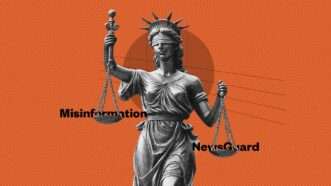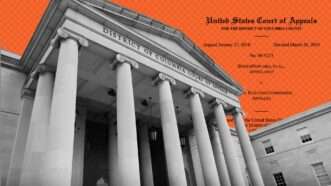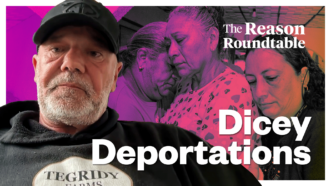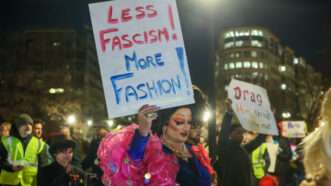Civil Liberties
"The 2024 Presidential Campaign Saw a Massive Disinformation and Misinformation Campaign, …
which likely helped bring the current administration into power."
To Remain Canadian, Our Northern Neighbors Should Become a Little More American
Canada long relied on the U.S. for protection. Now it needs to rediscover self-reliance.
Universities Should Challenge Trump's Speech-Based Deportations of Students in Court [Updated]
A lawsuit brought by universities could potentially be much more effective than leaving individual students to fend for themselves.
Marco Rubio Says He's Revoked 300 Student Visas Over Campus Activism
"We're looking every day for these lunatics that are tearing things up," Rubio said in a Thursday press conference.
Pam Bondi Aims To Revive a Moribund Legal Process for Restoring Gun Rights
A new Justice Department rule could help "prohibited persons" who pose no threat to public safety.
Paul Clement's Argument Against the Executive Order Targeting the WilmerHale Law Firm
It's a lawyer's argument, not an attempt at objective analysis. But I think that on balance it is generally quite correct, and powerfully framed.
The 'Meritocracy' Lie
Two months after he was inaugurated, Trump has smashed many of the government's silly DEI rules. But he hasn't created a new age of meritocracy.
Black Student Expelled for Sexual Assault of White Classmate Seeks Pseudonymity Partly Because "Interracial Sexual Relationships …
between White women and Black men are the subject of heightened prejudice and violent responses that create a tangible risk of retaliation and animus against him."
Signal Chat Controversy Is an Endorsement of Encryption Software
Popular encryption apps are probably secure if government officials rely on them.
Federal Judge Tosses Defamation Lawsuit Against NewsGuard
The self-styled watchdog site ranks news outlets' reliability, which has rankled those on both the right and left.
Kristi Noem Uses El Salvador's Nightmarish Megaprison To Create Content
The Homeland Security secretary's use of El Salvador's largest prison for propaganda is unethical and an endorsement of an autocratic justice system.
What VanDerStok Says about Agency Interpretations of Statutes
The Court's opinion upholding federal regulation of "ghost guns" makes passing reference to Loper Bright Enterprises.
Brazil Sentenced a Woman to 14 Years for Lipstick Graffiti
Débora Albuquerque scrawled “You lost, dude” on a statue. Now she’s being treated like a national security threat.
Why I'm Not Deleting My 23andMe Genetic Data
And you shouldn't be panicked into doing it either.
Ninth Circuit Declines to Block Idaho's "Biological Sex" Restrictions for Multi-Occupancy School Restrooms, Locker Rooms, and Shower Rooms
The court leaves open, though, the possibility that a narrower challenge aimed just at restrooms with closed stalls, where students wouldn't generally be partly or fully undressed where others can see them.
Georgia Backs Bill To Reaffirm Independent Kids, Protect Free-Range Parents
"Some people think that this is not one of those things that's super important—until you're affected by it," says David DeLugas.
Arizona Legislators Are Immune From Traffic Tickets During Session. A New Proposal Wants To Change That.
Legislators have used the state Constitution to avoid accountability for egregious traffic violations.
Libel Claims by The Satanic Temple Against Newsweek Over Sexual Abuse Allegations …
thrown out for lack of evidence of "actual malice" (i.e., knowing or reckless falsehood on Newsweek's part).
Parent Submits Photo of School Postings to LibsOfTikTok, Gets Restricted from Accessing School Property or Events
A federal court, however, has now largely blocked this restriction; the court rejected the argument that the parent violated the school's "bullying" policy.
15 Years of Super PACs
The SpeechNow ruling expanded political speech and reshaped elections.
Texas A&M's Drag Ban Shows the Threat to Campus Free Speech Is Bipartisan
Conservatives are picking up the unconstitutional weapons that intolerant progressives have deployed against them.
Sleepwalking Into a Cashless Society
Central bank digital currencies would destroy any chance for financial privacy, but society is willingly moving in that direction.
Justice Department Invokes State Secrets Privilege Over Deportation Flights
The move is an escalation of the White House's attempt to claim an unchallengeable and unreviewable amount of power.
Judge Orders Rhode Island Town To Return Secretly Seized Land to Affordable Housing Developer
Plus: the federal government tries to stiff landlords over eviction moratorium one last time, the Supreme Court declines to take up eminent domain case, and starter home bills advance in Arizona and Texas.
Trump's War With the Courts
Plus: A listener asks why some American libertarians seem to unquestioningly accept everything Vladimir Putin says.
FIRE Says the Law Trump Is Using To Deport Mahmoud Khalil Is Unconstitutional. Trump's Sister Agreed.
As a federal judge, Maryanne Trump Barry said the provision is unconstitutionally vague. That's especially problematic when it is used to punish speech.
Supreme Court Refuses to Hear Case that Might Have Led to Overruling of Kelo v. City of New London
We don't know why the justices chose not to take it.
Federal Judge Blocks Texas A&M From Banning Drag Shows
The judge ruled that Donald Trump and Texas Gov. Greg Abbott's executive orders targeting "gender ideology" can't change the fact that drag performance is expressive conduct under the First Amendment.
The Truth About Brazil's Rumble Ban
Justice Alexandre de Moraes has shut down Rumble in Brazil, using the same dubious legal arguments that led to the blocking of X and Telegram.
New Case Against Khalil
Plus: Sanders supports deportations, tariff tracker, Panama's Jewish enclave, and more...
Woman Compensated for Vaccine Injury Seeks to Have Name Redacted Because She Works in Vaccine-Related Public Relations
"She 'does not want her experience with [a] poorly administered vaccine to become a story in itself that would interfere with her ability to advocate for vaccinations at large.'"
Lawsuit Challenges Use of Eminent Domain as NIMBY Tool to Block Housing Project
A Rhode Island town seeks to use eminent domain to block construction of a large-scale affordable housing project.
Trump's Reading of the Alien Enemies Act Defies the Usual Meaning of Its Terms
To justify the immediate deportation of suspected Venezuelan gang members, the president is invoking a rarely used statute that does not seem to apply in this context.
Will ICE Use the Alien Enemies Act To Enter Homes Without Warrants?
Already this year, the agency has allegedly conducted a warrantless raid in Newark and several warrantless arrests in the Midwest.
Chicago Public Defender's Claim Over Displaying Photo with Israeli Flag and Gun Can Go Forward
Office leadership allegedly "told Gassman's supervisors that the photo was 'comparable to a Nazi swastika.'"
Another Legal Resident Faces Deportation for Vague Allegations That They Support Terrorists
The Trump administration keeps arresting legal immigrants with views they don't like.
National Constitution Center Podcast on the Alien Enemies Act and Mahmoud Khalil Immigration Cases [Updated]
The participants were Adam Cox (NYU) and myself.































